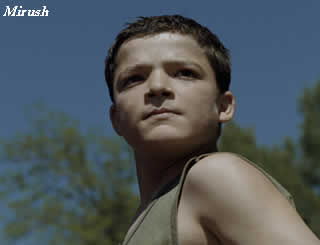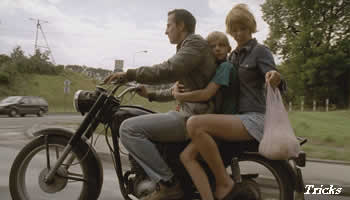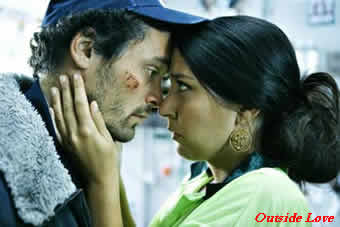 In a series of connecting “tent-palaces” housing two 1,000-seat theaters on the banks of the Rhine in Mannheim, Germany, and simultaneously in the historic center of Heidelberg, the university town half an hour up the Neckar from Mannheim, this 56-year-old festival of art-house cinema prides itself in launching newcomers. It announced its laureates on October 21 after twelve days of Competition and Discovery screenings, with an homage to Ingmar Bergman as well, and a wide showcase of New Chinese Cinema. Presiding on the International Jury this year were Hanna Lee, producer of the award-winning Korean films, Turning Gate, Woman Is the Future of Man, and Secret Sunshine; Thomas Mauch, cinematographer for Edgar Reitz, Alexander Kluge and Werner Herzog, including Stroszek, Aguirre, The Wrath of God, and Fitzcarraldo; and scholar, author, and art-house film programmer and exhibitor Frans Westra, who has sat on the boards and selection committees of several key Dutch film festivals.
In a series of connecting “tent-palaces” housing two 1,000-seat theaters on the banks of the Rhine in Mannheim, Germany, and simultaneously in the historic center of Heidelberg, the university town half an hour up the Neckar from Mannheim, this 56-year-old festival of art-house cinema prides itself in launching newcomers. It announced its laureates on October 21 after twelve days of Competition and Discovery screenings, with an homage to Ingmar Bergman as well, and a wide showcase of New Chinese Cinema. Presiding on the International Jury this year were Hanna Lee, producer of the award-winning Korean films, Turning Gate, Woman Is the Future of Man, and Secret Sunshine; Thomas Mauch, cinematographer for Edgar Reitz, Alexander Kluge and Werner Herzog, including Stroszek, Aguirre, The Wrath of God, and Fitzcarraldo; and scholar, author, and art-house film programmer and exhibitor Frans Westra, who has sat on the boards and selection committees of several key Dutch film festivals.
With this and other juries intact, Dr. Michael Koetz, the Festival Director, claimed, “We are a wellness holiday from loneliness…. If cinema is authentic, then you have a real chance of going home afterwards as someone who has found new friends and is happy to be no longer alone.” And even if “it is all just virtual, and is probably going to evaporate again,” he told the audience at the Opening Gala, “it might still be an example of what is possible.” A cinema of the possible — singular, personal, and true — a cinema of stories and dreams that can bring us together: it’s a fair estimate of what Mannheim is all about, and the best testament to this claim is the prizes themselves.
loneliness…. If cinema is authentic, then you have a real chance of going home afterwards as someone who has found new friends and is happy to be no longer alone.” And even if “it is all just virtual, and is probably going to evaporate again,” he told the audience at the Opening Gala, “it might still be an example of what is possible.” A cinema of the possible — singular, personal, and true — a cinema of stories and dreams that can bring us together: it’s a fair estimate of what Mannheim is all about, and the best testament to this claim is the prizes themselves.
My five favorites, which won a number of the awards, all had to do with human connection, and often at the core of that connection were fathers and sons. Mirush, by Norwegian Marius Holst, won the Main Award of Mannheim-Heidelberg and is perhaps the most complex of the renderings of father-son bonds, for better and worse, in reality and in the imagination. What Mirush does best is to show us on the wide screen, in glorious cinemascope, how grand and desperate is the imagination of a boy who has created an idol of his father in the absence of the man. In the action of the film  we see the man; the boy catches up with him after many years and tries to get to know him, expecting the best, and finding the worst — or is it? Because, just maybe, Mirush needs to turn his back on his father to love himself. Enrico Lo Verso is heart-rending, as always, as Mirush’s Albanian father in Norway, and Nazif Muarremi as the adolescent Mirush is astonishing, as the jury put it, “an angel of death yet an expression of life.”
we see the man; the boy catches up with him after many years and tries to get to know him, expecting the best, and finding the worst — or is it? Because, just maybe, Mirush needs to turn his back on his father to love himself. Enrico Lo Verso is heart-rending, as always, as Mirush’s Albanian father in Norway, and Nazif Muarremi as the adolescent Mirush is astonishing, as the jury put it, “an angel of death yet an expression of life.”
Andrzej Jakimowski, on a return visit to Mannheim-Heidelberg after his debut feature, Squint Your Eyes, was screened there five years ago, this time received a Special Award from the International Jury for Tricks, also a boy’s quest to find his father. How differently it plays out from the way Mirush does. Fantasy and reality are choreographed together with the techniques of cinema as the little boy lives out his dreams in a remote town in provincial Poland today. Ever the conjurer, six-year-old Stefek has his way, even when fate turns its back on him and his tricks go wrong. Jakimowski shows us what a modern-day fairy tale looks like, with a free style of cinema that can make even a child spellbound.
Estrellita — Take Away Song is the more conventional of the prize winners in its cinematic language. At the same time, this Slovenian tale of music and mourning displays Metod Pevec’s keen eye for striking images all the while the violin carries the song of the film. Thirteen-year-old Amir is drawn to a particular violin — “Estrellita,” as its owner named it, and that man, now deceased, is nonetheless a spiritual father to the boy whose own dad can’t stop drinking enough to notice his son’s talent. They live in old barracks as Bosnian refugees not far from where Amir met his “maestro” and played with him once in a pub. The best Amir can get from his real dad is a lift in the crane at his work site where father and son sit side-by-side as Amir plays his music “at the top of the world.” It’s a memorable shot, from a low angle straight up, and an equally memorable moment for both in the story about a father and son who must separate to find themselves. The International Jury gave Silva Cusin a Special Mention as the actress who plays the maestro’s widow. Both inspired and inspiring, she intuitively ensures her late husband’s legacy of music for Amir.
displays Metod Pevec’s keen eye for striking images all the while the violin carries the song of the film. Thirteen-year-old Amir is drawn to a particular violin — “Estrellita,” as its owner named it, and that man, now deceased, is nonetheless a spiritual father to the boy whose own dad can’t stop drinking enough to notice his son’s talent. They live in old barracks as Bosnian refugees not far from where Amir met his “maestro” and played with him once in a pub. The best Amir can get from his real dad is a lift in the crane at his work site where father and son sit side-by-side as Amir plays his music “at the top of the world.” It’s a memorable shot, from a low angle straight up, and an equally memorable moment for both in the story about a father and son who must separate to find themselves. The International Jury gave Silva Cusin a Special Mention as the actress who plays the maestro’s widow. Both inspired and inspiring, she intuitively ensures her late husband’s legacy of music for Amir.
 Two more films were favorites of mine, and also of many others. Outside Love, a Danish film by Daniel Espinosa, won the Audience Award and the Ecumenical Film Prize. Cover Boy… (The Last Revolution), by Carmine Amoroso from Italy, won a special Mention of the Ecumenical Jury. Both films won the Recommendation of Cinema Owners for promising a good exchange with viewers when they open in theaters. And both films feature loving fathers whose sons truly savor them and suffer their loss.
Two more films were favorites of mine, and also of many others. Outside Love, a Danish film by Daniel Espinosa, won the Audience Award and the Ecumenical Film Prize. Cover Boy… (The Last Revolution), by Carmine Amoroso from Italy, won a special Mention of the Ecumenical Jury. Both films won the Recommendation of Cinema Owners for promising a good exchange with viewers when they open in theaters. And both films feature loving fathers whose sons truly savor them and suffer their loss.
In Outside Love, three generations of men and boys learn from each other the value of work, family, and dreams, even though the families may mix it up a bit and the dreams may break the families apart. Shmuli Shapiro raises his five-year-old boy, Taylor, by himself after his wife dies. And what he would like most is to break out of his suburban ghetto on the edge of Copenhagen, or at least out of the four walls where he lives with his parents who keep re-living the extermination of the Jews and World War II. He has his heart set on New York, where he and Taylor and his friend Weinberger could walk in the footsteps of Joe DiMaggio. To save money for the trip, Shmuli works in a neighborhood shop run by Amina — Pakistani, Muslim, and a devotee of cricket. It’s as if their differences attract them, because one thing leads to another. In this film, loyalties follow logic, not tradition, and to the credit of the writer Daniel Dencik and the director, who both possess a very wide vision of the world, an unforgettable montage transpires with the cross-cutting between a son’s joy and a father’s crisis. It delivers a paradoxical union that is one of several meltdown moments, yet high points, of the film. David Dencik’s emotive energy and wellspring of tenderness in the lead role is of a piece with the poetry of Outside Love.
On another register, the gritty realism of Cover Boy… (The Last Revolution) renders fashion and consumerism as alluring but then devastating for a young émigré from post-communist Romania to capitalist Italy. As a child Ioan saw his father shot dead amidst the overthrow of Ceaucescu. Perhaps there is something worse than that — a peculiar déjà vu of that image as hijacked by the host country of his new life. Just as Ioan makes it from Bucharest to Rome to Milan where he becomes a successful model for photographers, his new Italian friend Michele is laid off as a cook and can barely hang on to his cleaning job at the train station. Ioan comes to discover quickly the ruthlessness of exploitation, but not soon enough. When fashion, the trendy slogan “Revolution,” and Ioan’s naked body come together on the same poster for selling jeans with a pose he can never forget, he has already lost the one man he valued as much as his father. Carmine Amoroso’s amazing drama, shot on digital video with a cinematography that so beautifully surpasses the slick ad photography it critiques, pierces the heart with the superb acting of familiar and beloved Eduard Gabia and newcomer Luca Lionello.

